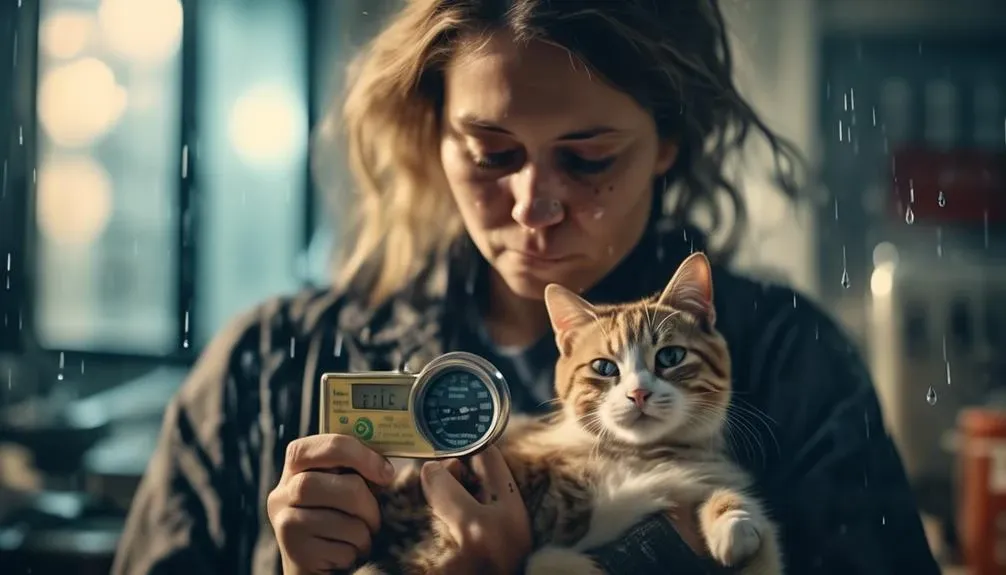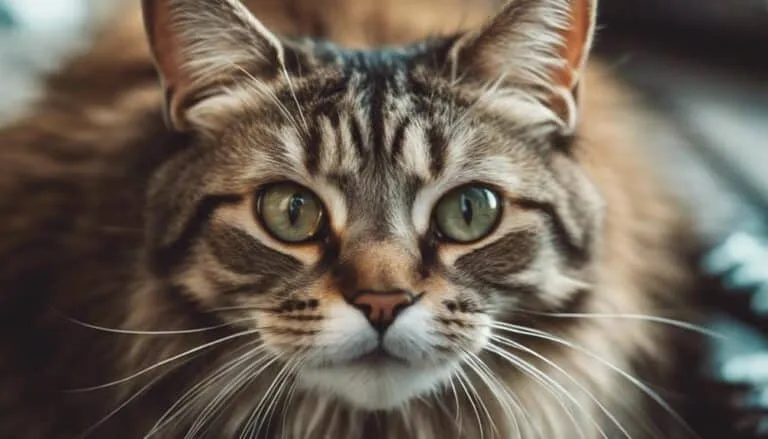The Best Fluffy Pancakes recipe you will fall in love with. Full of tips and tricks to help you make the best pancakes.

Pneumonia in cats is a grave concern for feline owners, as this respiratory infection can have hidden dangers lurking beneath the surface. While we may often associate pneumonia with humans, it is important to recognize that our feline companions are not immune to this potentially life-threatening condition.
However, the true extent of the risks and complications associated with pneumonia in cats may not be immediately apparent. In this discussion, we will explore the various aspects of this ailment, from its causes and symptoms to diagnosis, treatment options, and prevention strategies.
By shedding light on this topic, we hope to raise awareness and equip cat owners with the knowledge they need to protect their beloved feline friends.
Key Takeaways
- Pneumonia in cats can cause trouble breathing and insufficient oxygen in the blood, leading to symptoms such as open mouth breathing, lethargy, fever, coughing, and loss of appetite.
- Causes of pneumonia in cats include aspiration of foreign substances, bacterial or viral infections, fungal infections, and rare parasitic infections.
- Cats with weak immune systems are more at risk for pneumonia.
- Diagnosis and treatment of pneumonia in cats require a visit to the veterinarian, with options ranging from hospitalization for severe cases to home care for less severe cases. Treatment may include antibiotics, antifungal medications, drugs to reduce inflammation, and monitoring through chest X-rays.
Signs of Pneumonia in Cats
Recognizing the signs of pneumonia in cats is crucial for timely diagnosis and treatment. Cat pneumonia symptoms can vary, but common signs include open mouth breathing, lethargy, fever, coughing, rapid and heavy breathing, loss of appetite, and possible bluish color to the gums. If you notice any of these symptoms, it is important to seek veterinary care immediately.
Preventing pneumonia in cats can be challenging, but there are steps you can take to reduce the risk. Keeping cats indoors helps to minimize exposure to parasites and fungi that can lead to pneumonia. Additionally, caution should be taken when administering liquid medication to prevent aspiration. Regular veterinary check-ups and vaccinations can also help maintain a cat's overall health and strengthen their immune system, reducing the likelihood of developing pneumonia.
Causes of Pneumonia in Cats
Pneumonia in cats can be caused by various factors. These include aspiration of foreign substances, bacterial or viral infections, fungal infections, and rare parasitic infections.
Aspiration pneumonia occurs when cats inhale foreign objects, such as food or liquids, into their lungs. Bacterial and viral infections, such as feline herpesvirus or feline calicivirus, can also lead to pneumonia. Fungal infections, such as cryptococcosis or histoplasmosis, are another potential cause. Additionally, rare parasitic infections, like lungworms or toxoplasmosis, can result in pneumonia.
It's important to note that the long-term effects of pneumonia in cats can be detrimental, especially if left untreated or if the cat has a weakened immune system. In severe cases, pneumonia can lead to chronic respiratory problems or even death. Therefore, it is crucial to seek veterinary care promptly if pneumonia is suspected in a cat.
Diagnosis and Testing for Pneumonia in Cats
To accurately diagnose and test for pneumonia in cats, a thorough examination by a veterinarian is necessary. The veterinarian will first observe the cat's symptoms and medical history.
They may then perform diagnostic tests such as chest X-rays and bloodwork. Chest X-rays are essential for evaluating the condition of the lungs and identifying any abnormalities such as fluid accumulation or inflammation. Bloodwork can help determine if there is an infection present and assess the overall health of the cat.
This may involve a complete blood count (CBC) to check for any abnormalities in the white blood cell count, as well as a blood chemistry panel to evaluate organ function. These diagnostic tests are crucial in confirming the diagnosis of pneumonia and guiding appropriate treatment options.
Treatment Options for Pneumonia in Cats
Treatment options for pneumonia in cats vary depending on the severity and underlying cause of the infection. In more severe cases, hospitalization may be required, where the cat can receive close monitoring and necessary interventions. This may include intravenous fluids, oxygen therapy, and administration of medications such as antibiotics or antifungal drugs. Hospitalization allows for more intensive care for very sick cats, ensuring they receive the necessary support to recover.
For less severe cases of pneumonia, home care may be an option. This involves providing a quiet and comfortable environment for the cat to rest and recover. Medications prescribed by the veterinarian, such as antibiotics or anti-inflammatory drugs, should be administered as directed. It is important to monitor the cat's condition closely and seek immediate veterinary attention if there is no improvement or if symptoms worsen. Regular follow-up visits and chest X-rays may be necessary to track the progress of the pneumonia and adjust the treatment plan accordingly.
Contagiousness of Pneumonia in Cats
Contagiousness is an important aspect to consider when it comes to pneumonia in cats. While fungal, parasitic, and aspiration pneumonia are generally not contagious, bacterial or viral pneumonia can be transmitted to other pets. This necessitates the implementation of separation and hygiene measures to prevent the spread of the infection.
Although it may be difficult to prevent bacterial and viral pneumonia, keeping cats indoors can reduce the risk of encountering parasites or fungi that can lead to pneumonia. Additionally, caution should be taken when administering liquid medication to cats to avoid aspiration.
Prevention of Pneumonia in Cats
When it comes to ensuring the health and well-being of cats, taking proactive measures to prevent pneumonia is crucial. Here are some key steps that cat owners can take to minimize the risk of their feline companions developing pneumonia:
- Vaccination effectiveness: Keeping up to date with vaccinations is an essential part of preventing pneumonia in cats. Vaccines can protect against common respiratory infections, such as feline herpesvirus and feline calicivirus, which can lead to pneumonia if left untreated.
- Importance of regular vet check-ups: Regular visits to the veterinarian are vital for monitoring your cat's overall health and detecting any early signs of respiratory problems. Your vet can perform a thorough examination, including listening to your cat's lungs, and provide appropriate preventive care recommendations.
- Indoor living: Keeping cats indoors helps reduce the risk of exposure to potential respiratory pathogens, such as parasites or fungi, which can cause pneumonia. It also minimizes the chance of coming into contact with infected animals.
The Role of Medication in Pneumonia Treatment
Medication plays a crucial role in the treatment of pneumonia in cats, helping to combat the infection and alleviate symptoms. Antibiotics are the primary medication used to target bacterial pneumonia, which is the most common form of the disease in cats. These medications work by killing or inhibiting the growth of bacteria, effectively clearing the infection.
However, it is important to note that the effectiveness of antibiotics may vary depending on the specific bacteria involved and the overall health of the cat. In some cases, alternative therapies such as antifungal medications may be necessary if the pneumonia is caused by a fungal infection.
It is essential to consult with a veterinarian to determine the most appropriate medication for treating pneumonia in cats and to closely monitor the cat's response to treatment.
Monitoring Pneumonia Recovery in Cats
After initiating the appropriate medication for treating pneumonia in cats, it is crucial to closely monitor the cat's recovery progress to ensure successful healing and to address any potential complications that may arise. Here are some important aspects to consider when monitoring the recovery of a cat with pneumonia:
- Chest X-ray monitoring: Regular chest X-rays may be necessary to assess the improvement in lung inflammation and to detect any persistent abnormalities.
- Observation of symptoms: Continuously observe the cat for any signs of relapse or worsening symptoms such as difficulty breathing, coughing, or decreased appetite.
- Home care tips: Provide a warm and comfortable environment for the cat to rest and recover. Ensure that the cat has access to fresh water and a balanced diet to support the healing process. Administer medication as prescribed by the veterinarian, following the correct dosage and schedule.
Additional Considerations for Cat Owners
Cat owners should be aware of several important considerations to ensure the well-being and proper care of their feline companions.
One consideration is the adoption of working cats for pest control purposes in places like barns, factories, and warehouses. When adopting a working cat, it is crucial to consider their temperament and health to ensure they are suitable for the job and can thrive in their environment.
Another consideration is the presence of black lips in cats. Cats have black lips due to the presence of dark pigmentation, which provides protection against sunburn and skin cancer. The melanin in their lips helps absorb harmful UV rays, and this trait has likely evolved as a natural adaptation.
Understanding these additional considerations can help cat owners make informed decisions and provide the best care for their feline companions.
Conclusion
In conclusion, pneumonia in cats is a serious respiratory infection that requires timely recognition and intervention. With various causes and potential complications, accurate diagnosis and appropriate treatment are essential.
By understanding the contagiousness and practicing preventive measures, cat owners can minimize the risk of pneumonia.
The role of medication, along with monitoring for recovery, plays a crucial role in the treatment process.
By staying vigilant and providing necessary care, cat owners can ensure the well-being of their feline companions.








